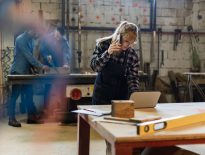
Make way for radical jobs rethink

Pandemic has proven how fast we can change if we have to
At the beginning of the COVID-19 pandemic, when our lives, livelihoods and future were threatened, we made years of progress in a few months.
We moved off-base and online. We redefined our use of time and space as we became more flexible and agile, with new ways of communicating and working together. We saw ourselves – and each other – in different contexts. We thought and acted in ways that we had previously felt were out of our reach.
Social media, news articles and politicians brought almost forgotten maxims like “Health is the primary wealth” and “We’re all in this together” into the modern dialogue.
Over these past six months, we have come to see how we have been separating work and life. This time has proven that success and satisfaction are about how we bring together the elements of life into a coherent whole. A successful life constantly weaves work, contribution, relationships, health, well-being, leisure, learning and finance into a whole and fulfilling existence.
We need to relearn how to live and work at a more local, relational and human scale, and to redefine work and the workplace through core human values, such as care, truth, support, trust, and relationships.
As we come out of the current crisis, we are beginning to think and act differently about how we build our careers.
The workforce and workplace have been fundamentally changed by COVID-19 – we now know there is no ‘going back to normal’, including returning to the traditional way of working.
What can we learn from this time to develop a new approach?
We’ve been reminded that purposeful work brings feelings of dignity, meaning and community. We have practised new ways of working that have shown us that change is possible. We’ve valued spending time doing things that are important to us – and have come to realise that when we get the mix right, we have more time for these things than we previously thought.
The future of working, job-seeking and recruitment must evolve to adopt these same principles. We need to view successful careers differently.
To move forward, we must start by redefining what a career actually is. Taking on board our recent learnings, a career could be viewed as “past and present activities that influence future roles in the course of a lifetime”.
This new description breaks the linear and incremental notion of careers, instead positioning career as a life-long collection of activities and roles across all of the elements of our lives – not just work itself.
Those activities and roles might include working with our family to prepare tonight’s dinner, working as a goalie in our soccer team, communicating with our friends, learning how to garden, studying to be a teacher and working for the local hardware shop.
A truly successful career requires us to think and act differently – to integrate all of life’s elements to support one another and develop a relationship-centred approach to work.
A successful career does not have a fixed start or end point. We are all walking on a career path that we can only see when we look backwards. Looking forward there are potentially a million paths at any moment, and we make choices and open possibilities along our life journey.
In an algorithm dominated world, where people become their data, employment has been reduced to a transaction. Our challenge is to move career transitions towards relationships.
We are regularly reminded of the negative outcomes of the current transaction-driven recruitment process. We’ve all heard stories of job seekers who have applied for more than 200 positions, only to be continually rejected. Frequent research and reports reveal findings like “up to 85% of employees are disengaged”, “over 80% of employers can’t find suitable recruits” and “over 60% of employees are actively looking for another job”.
By defining careers differently, with career paths anchored in probability rather than certainty, a career becomes self-directed and guided by personal values and vision.
When we move away from transactional recruitment methodologies, we also move away from work being viewed as a transaction of time for money. In a rapidly changing workplace, successful careers see the employer and the employee in a more creative relationship, where a job is recognition of future contribution.
One of our key learnings through COVID-19 is that we are all participants in and contributors to a single interconnected system. We all play a role in helping business and the labour market return to operational health. To do this, we need greater clarity of our values, purpose and career direction and we all need new skills for building our career.
Successful employment means that the individual finds themselves in the right role, at the right time with the right employer. For the employer, it results in the right person in the right place at the right time, with the skills and mindset to change when needed.
This leaves all employees with a sense of security which they take home with them at the end of the day and voluntarily bring back with them each morning. This culture of contribution is personally meaningful for the individual, as well as beneficial for the employer – and in turn, the economic success of the labour market.
As a community, we must now use our shared learnings to create an approach to employment that supports the success of all of us.
Because of the context of the pandemic and our island culture built on relationships, how can we create careers in a much more effective manner?
This article was written for, and published in, The Mercury on Saturday 12 December 2020. It is one of a three part series and you can view the other two articles at the below links:

